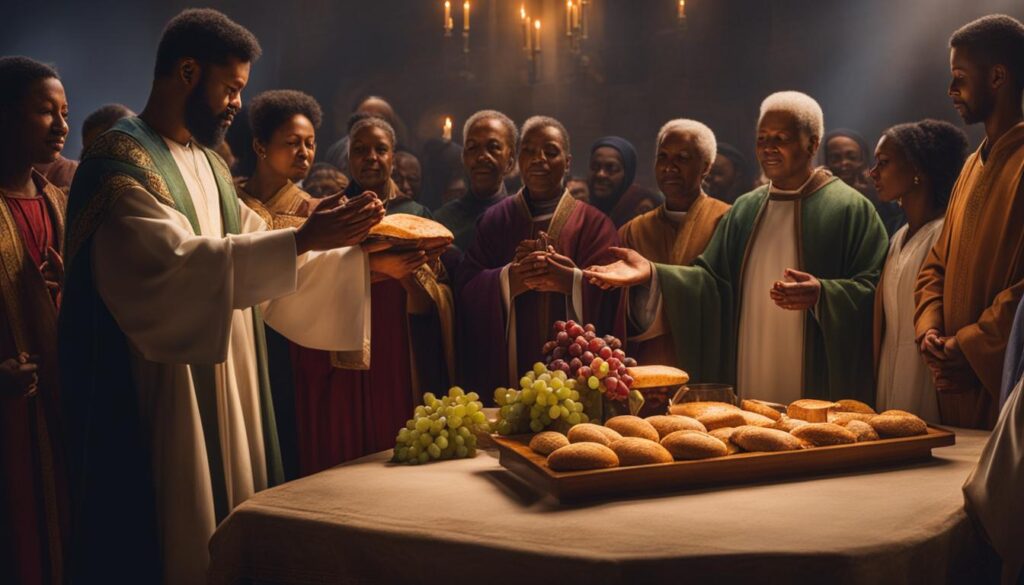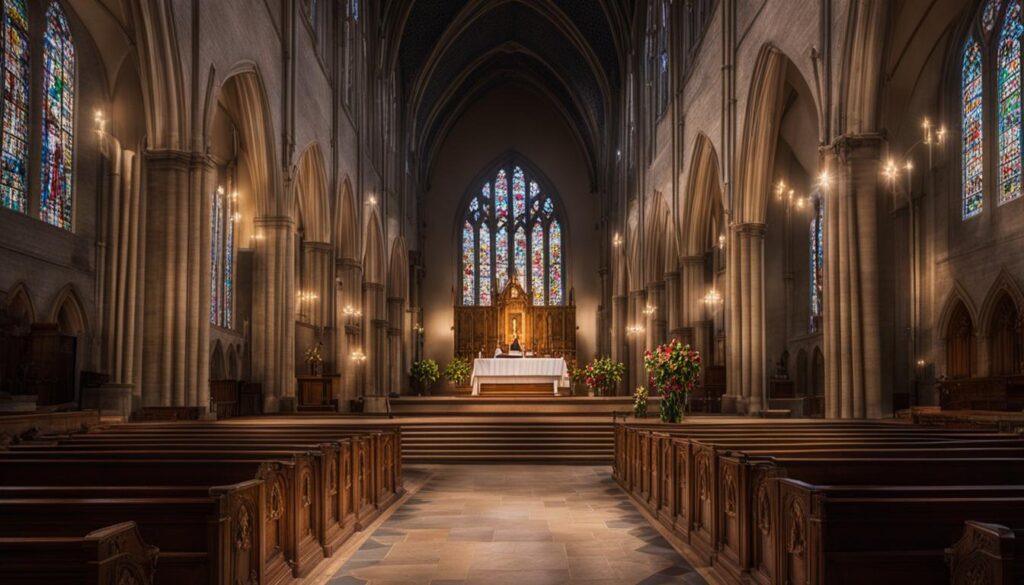Protestants often wonder if they can partake in Catholic communion. The Catholic Church has specific guidelines on who can participate in the Eucharist, but there are exceptions and considerations to be aware of. Let’s delve deeper into this topic to gain a better understanding of the boundaries and possibilities.
Key Takeaways:
- Protestants may have limitations in receiving Catholic communion due to specific guidelines set by the Catholic Church.
- The Catholic belief in transubstantiation, where the bread and wine become the body and blood of Jesus Christ, differs from many Protestant traditions.
- Non-Catholics are welcome to participate in the Mass, but receiving a blessing is the primary practice during the distribution of communion.
- Understanding the different perspectives on communion among Christian denominations is crucial for fostering respect and unity.
- Each individual is responsible for discerning their own beliefs and practices regarding communion.
Understanding Transubstantiation and Eucharistic Miracles
The belief in transubstantiation sets the Catholic understanding of the Eucharist apart from many Protestant traditions. This belief holds that the bread and wine used in the Mass actually become the body and blood of Jesus Christ. While this may seem strange to Protestants who view communion as symbolic, the Catholic Church has a long history of Eucharistic miracles that are believed to provide tangible evidence of this transformation. It is important to note that these miracles are specific to the Catholic understanding of the Eucharist.
Transubstantiation, defined by the Council of Trent in the 16th century, is based on the words of Jesus during the Last Supper. Catholics believe that through the consecration performed by the priest during the Mass, the substance of the bread and wine is changed while the accidents, or physical appearances, remain the same. This means that although the bread and wine still look and taste like bread and wine, they have become the true body and blood of Christ.
The Catholic Church holds that Eucharistic miracles provide visible proof of this transformation. These miracles often involve the bread and wine turning into human flesh and blood or remaining perfectly preserved over long periods of time. While these miracles are not required for Catholics to believe in transubstantiation, they serve as a powerful testament to the real presence of Christ in the Eucharist.
Requirements for Receiving Catholic Communion
The Catholic Church has specific requirements for receiving communion, and these guidelines apply to both Catholics and non-Catholics. In order to participate in the Eucharist during a Catholic Mass, one must meet certain conditions.
Baptized Catholic in a State of Grace
To receive Catholic communion, an individual must be a baptized Catholic in a state of grace. This means that they have been baptized in the Catholic Church and are not conscious of any serious unconfessed sins. Being in a state of grace is essential to fully participate in the sacrament and receive the spiritual benefits it offers.
Observing the One-Hour Fast
In addition to being a baptized Catholic in a state of grace, individuals must observe the one-hour fast before receiving communion. This means abstaining from both food and drink, except for water and medicine, for at least one hour before the reception of the Eucharist. This practice helps to prepare the body and mind for the sacred act of receiving the body and blood of Christ.
Restrictions for Protestants
These requirements for receiving communion also apply to Protestants who wish to participate in a Catholic Mass. If a Protestant has not been baptized in the Catholic Church and does not meet the other criteria, it is recommended that they refrain from receiving Catholic communion. However, non-Catholics are still welcome to attend Mass and can receive a blessing from the priest during the distribution of communion.
- To receive Catholic communion, one must be a baptized Catholic in a state of grace.
- Observing the one-hour fast before receiving communion is required.
- Protestants who have not been baptized in the Catholic Church and do not meet the other criteria should refrain from receiving Catholic communion.
Welcoming Non-Catholics to Participate
Although non-Catholics are generally not permitted to receive Catholic communion, the Catholic Church still extends an invitation to non-Catholics to participate in the Mass. Non-Catholics are encouraged to join in the prayers and worship, and they can receive a blessing from the priest during the distribution of communion.
The Catholic Church recognizes that not everyone who attends Mass may be able to receive communion due to differing beliefs and practices. However, it values the presence of non-Catholics and wants them to feel included in the worship experience.
Participating in Prayers and Worship
Non-Catholics can actively engage in the prayers and hymns during Mass. They can join in the communal aspects of the liturgy, such as standing, sitting, and kneeling. By participating in these elements, non-Catholics can still feel connected to the worship community and experience the spiritual atmosphere of the Mass.
Receiving a Blessing
During the distribution of communion, non-Catholics can approach the priest with their arms crossed over their chest. This gesture indicates that they are not receiving the Eucharist but would like to receive a blessing instead. The priest will then offer a blessing, often by making the sign of the cross on the forehead, as a way of acknowledging the non-Catholic’s presence and inviting them to share in the spiritual blessings of the Mass.
Exploring Different Perspectives
Understanding Protestant Views
Protestant denominations have varying beliefs and practices when it comes to communion. While many Protestants view communion as a symbolic act of remembrance, some non-Catholic Christians may hold a more sacramental understanding similar to the Catholic belief in the real presence of Christ in the Eucharist. It is important to recognize that each denomination has its own distinct teachings and practices regarding communion.
Respecting Denominational Differences
When discussing the topic of Protestants receiving Catholic communion, it is crucial to respect the boundaries and beliefs of each Christian tradition. While the Catholic Church has specific requirements for participation in the Eucharist, it is equally important for Protestants to honor their own denominational practices. Engaging in respectful dialogue and understanding different perspectives can foster unity among believers.
Seeking Common Ground
Despite theological differences, there are elements of communion that can bring Christians together. The act of sharing a meal, gathering in worship, and recognizing God’s presence can be unifying experiences for believers of various denominations. As Christians, it is essential to focus on the shared values of love, grace, and the teachings of Jesus Christ, which transcend denominational boundaries.
The Importance of Unity in the Eucharist

The Catholic Church views the Eucharist as a sacrament that promotes unity among believers. Partaking in communion is not just an individual act but also a communal one. It signifies a connection to the Heavenly mass and serves as a unifying force that brings Catholics together with Christ and other members of the Church.
While this unity is extended to all Catholics, it is not yet fully shared with non-Catholics. As a result, the Catholic Church restricts access to communion to those who align with its beliefs. This limitation is rooted in the Church’s understanding of the Eucharist as the real presence of Jesus Christ.
The Significance of the Eucharistic Warning
In 1 Corinthians 11:27-30, the Bible includes a strong warning about receiving the Eucharist unworthily. It admonishes individuals who partake in the body and blood of Christ without discerning its significance and without being in a state of grace. The Catholic Church takes this warning seriously and sets guidelines for participation to uphold the sacredness of the Eucharist.
It is essential to understand that the restrictions on non-Catholics receiving communion are not meant to exclude or alienate anyone. Instead, they reflect the Catholic Church’s commitment to preserving the integrity and sanctity of the Eucharist, as well as its deep-rooted beliefs about the nature of the sacrament.
The Significance of the Eucharistic Warning
Receiving the Eucharist unworthily carries great significance in the Catholic Church. The warning regarding this can be found in the Bible, specifically in 1 Corinthians 11:27-30. These verses highlight the importance of discerning the significance of the body and blood of Christ and being in a state of grace before partaking in communion. The Catholic Church takes this warning seriously and seeks to protect the sacredness of the Eucharist by setting guidelines for participation.
In order to receive Catholic communion, one must meet specific requirements and be in accordance with the teachings of the Church. This ensures that participants hold a deep understanding and respect for the significance of the Eucharist. The warning serves as a reminder to approach the sacrament with reverence and understanding, recognizing its profound spiritual meaning.
By emphasizing the Eucharistic warning, the Catholic Church aims to foster a greater sense of holiness and reverence among believers. It encourages individuals to reflect on their own faith and readiness to partake in the Eucharist. This warning also serves as a reminder for Catholics and non-Catholics alike to approach communion with humility and respect, acknowledging the sacred nature of the sacrament.
Conclusion
The question of whether Protestants can receive Catholic communion is a complex one without a one-size-fits-all answer. The Catholic Church has specific requirements for participation in the Eucharist, which apply to both Catholics and non-Catholics. While non-Catholics are generally not permitted to receive Catholic communion, they are still welcomed to participate in the Mass and receive a blessing from the priest.
Understanding the beliefs and practices of different Christian traditions surrounding communion is crucial in fostering respect and unity among believers. Each denomination has its own distinct teachings and practices, which should be acknowledged and respected. It is up to each individual to discern their own beliefs and practices regarding communion, guided by their own faith and understanding.
The Catholic Church sees the Eucharist as a sacrament that fosters unity among believers, connecting them to Christ and other members of the Church. While this unity extends to all Catholics, it is not yet fully shared with non-Catholics. Therefore, the Catholic Church restricts access to communion to those who share its beliefs and meet the requirements for participation.
FAQ
Can Protestants receive Catholic communion?
Protestants are generally not permitted to receive Catholic communion, but they are invited to participate in the Mass and receive a blessing from the priest.
What are the requirements for receiving Catholic communion?
To receive Catholic communion, one must be a baptized Catholic in a state of grace and have observed the one-hour fast before receiving communion.
Can non-Catholics participate in the Catholic Mass?
Non-Catholics are encouraged to join in the prayers and worship during the Catholic Mass and can receive a blessing from the priest.
Do different Christian traditions have different beliefs about communion?
Yes, different Christian traditions have varying beliefs and practices regarding communion, which should be respected.
Why does the Catholic Church restrict access to communion?
The Catholic Church restricts access to communion to those who share its beliefs in order to protect the sacredness of the Eucharist and maintain unity among believers.
What is the significance of the Eucharistic warning in the Bible?
The Eucharistic warning in 1 Corinthians 11:27-30 cautions against receiving the body and blood of Christ unworthily, and the Catholic Church takes this warning seriously.

